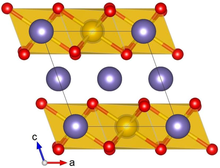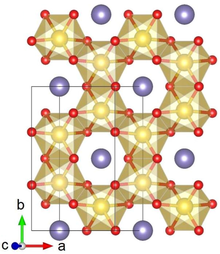
| |
 Crystal structure with Ru shown in yellow, Li in purple and O in red
| |
 Scale bar 0.1 mm
[1]
| |
| Names | |
|---|---|
|
Preferred IUPAC name
Lithium ruthenate | |
| Identifiers | |
3D model (
JSmol)
|
|
| |
| |
| Properties | |
| Li2RuO3 | |
| Appearance | Dark blue crystals |
| Structure | |
| Monoclinic, P21/m [2] | |
Formula units (Z)
|
4 |
| Related compounds | |
Other
anions
|
Lithium iridate, lithium platinate |
Except where otherwise noted, data are given for materials in their
standard state (at 25 °C [77 °F], 100 kPa).
| |
Lithium ruthenate, Li2RuO3, is a chemical compound of lithium, ruthenium and oxygen. It has a layered honeycomb crystal structure, and can be prepared by direct calcination of Ru metal and lithium carbonate at ca. 700 °C. [2] It is a potential lithium-ion battery electrode material, [2] though this application is hindered by the high costs of Ru, as compared to the cheaper Li2MnO3 alternative. [3]
References
- ^ Freund, F.; Williams, S. C.; Johnson, R. D.; Coldea, R.; Gegenwart, P.; Jesche, A. (2016). "Single crystal growth from separated educts and its application to lithium transition-metal oxides". Scientific Reports. 6: 35362. arXiv: 1604.04551. Bibcode: 2016NatSR...635362F. doi: 10.1038/srep35362. PMC 5066249. PMID 27748402.
- ^ a b c O'Malley, Matthew J.; Verweij, Henk; Woodward, Patrick M. (2008). "Structure and properties of ordered Li2IrO3 and Li2PtO3". Journal of Solid State Chemistry. 181 (8): 1803. Bibcode: 2008JSSCh.181.1803O. doi: 10.1016/j.jssc.2008.04.005.
- ^ Yoshio, Masaki; Brodd, Ralph J.; Kozawa, Akiya (17 July 2010). Lithium-Ion Batteries: Science and Technologies. Springer Science & Business Media. p. 10. ISBN 978-0-387-34445-4.